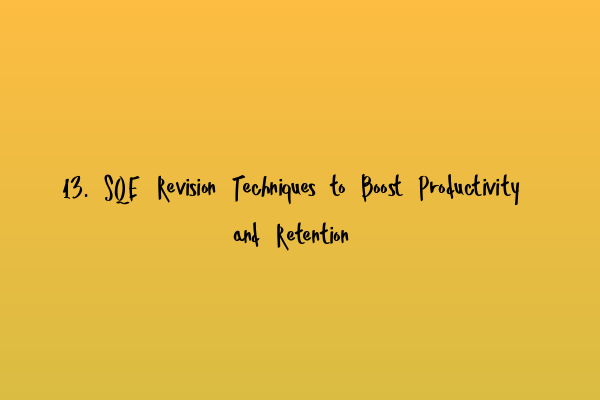13 SQE Revision Techniques to Boost Productivity and Retention
Are you preparing for the Solicitors Qualifying Exam (SQE)? As a future solicitor, it’s crucial to have effective revision techniques that not only boost your productivity but also help you retain the information you’ve learned. In this blog post, we will explore 13 SQE revision techniques that will maximize your study time and enhance your chances of success.
1. Create a Study Plan: Firstly, it’s vital to have a well-structured study plan. Organize your revision schedule by allocating specific time slots for each topic. This will help you maintain focus and ensure that you cover all the necessary areas. Don’t forget to include regular breaks to avoid burnout.
2. Set Goals: Break down your study plan into smaller, achievable goals. By setting specific targets, you will have a clear direction and a sense of accomplishment as you complete each milestone. This also allows for better tracking of your progress.
3. Utilize Practice Exam Questions: Practice makes perfect! Enhance your understanding by answering SQE 1 practice exam questions. This not only familiarizes you with the format of the exam but also helps you experience the time pressure. Check out our related article on SQE 1 practice exam questions (link).
4. Join Study Groups: Collaborating with fellow students can be immensely helpful. Engaging in discussions and sharing knowledge can deepen your understanding of the subjects. Through group study sessions, you can gain different perspectives and fill knowledge gaps.
5. Use Flashcards: Flashcards are an effective way to reinforce your memory. Create flashcards for key concepts, legal principles, and case law. Use them for quick revision during spare moments, such as commuting or waiting in line. This technique aids in retaining information in the long term.
6. Watch Video Tutorials: Visual learning can be highly engaging and effective. Take advantage of the numerous online video tutorials specifically tailored for SQE revision. These tutorials provide a dynamic approach to understanding complex legal concepts and can liven up your study routine.
7. Employ Mind-Mapping Techniques: Mind maps are excellent tools for visually organizing information. Create colorful diagrams to connect related concepts, cases, and statutes. This technique helps you view the bigger picture and improves recall during exams.
8. Condense Your Notes: Revisit your extensive notes and condense them into concise revision summaries. Rewrite the key points, highlighting the essential information. These condensed notes serve as a quick reference guide during your last-minute revisions.
9. Practice Mock Exams: Mock exams are invaluable in simulating the real exam environment. Attempt SQE 1 practice mocks FLK1 and FLK2 to further develop your exam technique and time management skills. Test yourself under exam conditions and identify areas that need improvement. Check out our related article on SQE 1 practice mocks (link).
10. Take Regular Breaks: It’s essential to give your brain regular breaks to rest and recharge. Studies show that taking short breaks every hour enhances focus and retention. Use these breaks wisely by going for a walk, practicing mindfulness, or engaging in a hobby that relaxes you.
11. Stay Active: Staying physically active has positive effects on the brain. Incorporate exercise into your daily routine to boost cognitive function, reduce stress, and increase attention span. Whether it’s a brisk walk, yoga, or a workout session, find an activity that suits you.
12. Review Past Papers: Explore past exam papers to familiarize yourself with the exam format and types of questions asked. Analyze the answers and identify patterns in the examiners’ expectations. Practicing with past papers can significantly enhance your performance on exam day.
13. Stay Informed: Keep updated with the latest changes and developments in the legal field. Stay connected with the SQE community and engage in discussions to broaden your knowledge. Stay informed about SQE 2 preparation courses (link) and SQE 1 preparation courses (link), as they can provide valuable guidance for your revision journey. Also, don’t forget to keep track of the SRA SQE exam dates (link).
In conclusion, effective revision techniques are essential for SQE exam success. By following these 13 strategies, you can boost your productivity, enhance your retention, and increase your chances of achieving the desired results. Remember, preparation is key, so start implementing these techniques into your study routine today and set yourself up for success in the SQE exams.
